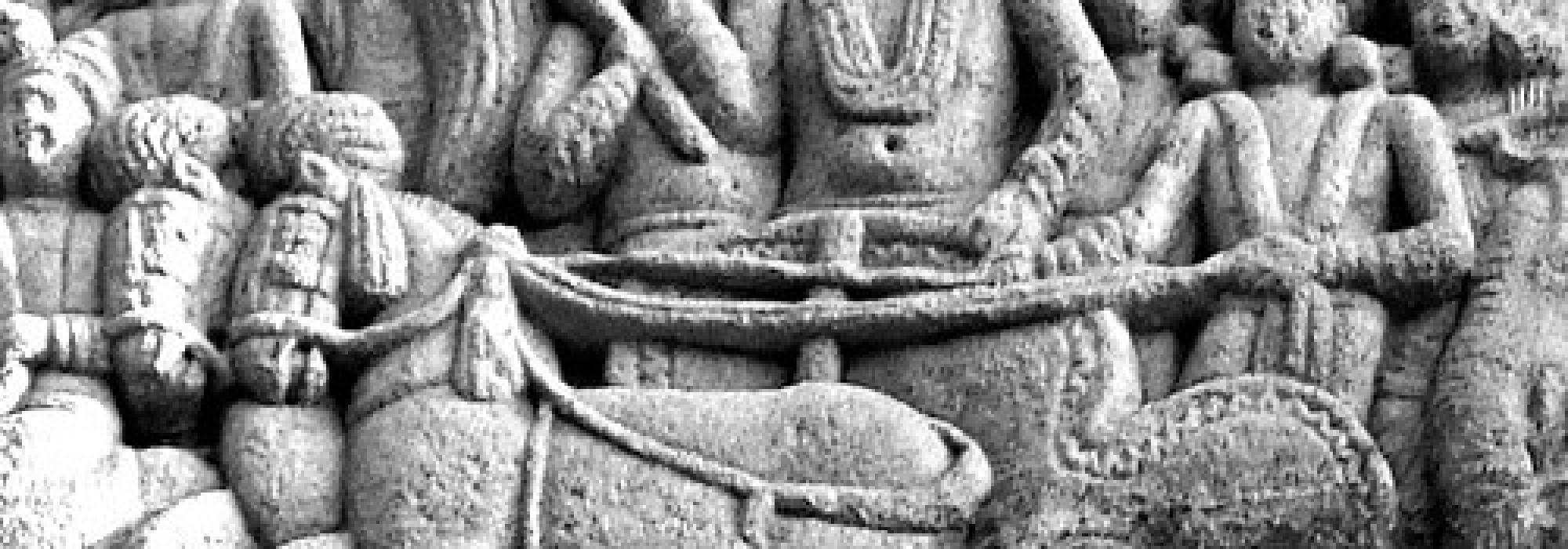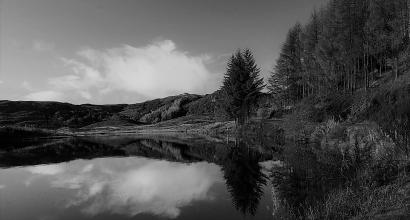Yaugandharāyaṇa then spoke to Vatsarāja. He said ‘O king, the divine is on your side and you have immense strength too. We are experts in the art of governance. Therefore, set out on your digvijaya – conquering expedition at the earliest.’ Listening to his Prime Minister’s suggestion, the king of Vasta said – ‘Let this wait for a moment. There can be several impediments for auspicious activities. Therefore, I will first worship Śiva. Is it even possible to fulfil our dreams without the blessings of Śiva? The ministers supported Vatsarāja’s tapas just as the monkeys supported Rāma in his efforts of building a bridge.
Accompanied by his queens and ministers, Vatsarāja observed fast for three days and meditated upon Śiva. The lord appeared in the king’s dreams and blessed him thus: ‘O king, I am pleased by your austerities. No obstacle will impede your path. Also, you will soon beget a son who will become the emperor of vidyādharas!’ An elated Yaugandharāyaṇa congratulated the king and said: ‘My king, only the riches obtained through dharma really last. The fact that you came upon the treasure buried by your ancestors proves this! Listen to a story related to this’, and proceed to narrate the following story:
The Story of the Merchant Devadāsa
Long ago, in Pāṭaliputra, there lived a rich merchant called Devadāsa. His wife was the daughter of a rich man from Pauṇḍravardhanapura. After Devadāsa’s father died, he fell into gambling habits and soon lost all his wealth. Alarmed by his condition, his father-in-law took his daughter back to Pauṇḍravardhanapura. Slowly, better sense dawned upon Devadāsa and he decided to mend his ways. He thought of approaching his father in law for financial help to restart his business. With this aim, he went to Pauṇḍravardhanapura. When he reached there though, he was overcome with embarrassment, given his own state. His clothes were shabby and his person, dirty. He sat down outside a shop wondering how he could bring himself to visit his father-in-law’s house in such a state. As darkness fell, a young man came, unlocked the shop’s door and went in and lit a lamp. A little later, a woman came stealthily, went inside that same shop and closed the doors behind her and locked it. As she was entering the shop, Devadāsa caught a glimpse of her in the light of the lamp. To his shock, the woman was none other than his wife! A shocked Devadāsa thought to himself: ‘Alas! A man addicted to bad habits and a married woman left to her own in her mother’s house are bound to meet such a fate!’ Even as he was trying to understand what just happened, he heard her voice. Gathering his wits, Devadāsa carefully listened in, hiding by the door. The conniving woman was telling her lover: ‘My husband’s great grandfather had buried a trunkful of gold at each of the four corners of our house in Pāṭaliputra. Just before he died, he disclosed this to one of his wives. In due course of time, on her deathbed, she told this to her daughter-in-law. Then on, in my family, this secret has been traditionally passed down from mother-in-law to daughter-in-law, and it eventually came to me. Although my husband lost all his wealth, I did not reveal this to him since he is a compulsive gambler. Since I hold you dear, I am telling you this. You must go forthwith and buy Devadāsa’s house. Later when you unearth all that buried gold, come back here and we can live together happily forever’. Listening to these words, Devadāsa immediately rushed back to Pāṭaliputra. Upon reaching home, he wasted no time in digging up his family treasure. Thanking gods for granting him this fortune, he started to get his business back on track.
Within a few days, the lecherous merchant from Pauṇḍravardhanapura came on the pretext of work and offered to buy Devadāsa’s house. Smarting from his wife’s treachery and desirous of teaching them both a lesson, Devadāsa agreed to his offer and sold it to him for a low price. He then moved into another house which he had bought with that money. He even got his wife back home from Pauṇḍravardhanapura! A couple of days later, upon discovering that there really was no gold, the lustful merchant approached Devadāsa and said: ‘I don’t like this house, it’s too old for me. Just take back your house and return my money!’ Devadāsa flatly rejected his offer. Their argument grew louder and the dispute eventually reached the king. Then, in front of the king, Devadāsa narrated the entire story of his wife and her paramour. An angry king attached the paramour’s entire wealth to the royal treasury and pronounced upon him a strict punishment. Devadāsa chopped off his deceiving wife’s nose and threw her out. He then married again and lived happily with his new wife, enjoying his family’s treasure for the rest of his life.
Thus anything attained by virtuous means will last for generations. Therefore a man, and a king in particular, should always earn money by adhering to dharma.
~
Everything was ready for the vijaya-yātra. The king honoured Gopālaka by giving him Videha; honoured Siṃhavarman, Padmāvatī’s brother by gifting him Cedi; and invited Pulindarāja. He started his expedition by attacking Brahmadatta, the king of Vāraṇāsī. His spies went ahead disguising themselves as kāpālikas. One among them anointed himself as the preceptor; all others became his pupils and declared that their preceptor was a trikālajña – knower of everything about past, present and future. Whatever he uttered they made it true. Thus, he was able to impress one of the favourite sons of Brahmadatta; from him they learnt all the secrets and reported everything to Yaugandharāyaṇa. Yogakaraṇḍaka, the minister of Brahmadatta poisoned everything in the path of Vatsarāja’s expedition; he sent viṣa-kanyās into his army; he also sent mercenaries who would kill people in the dark. Yaugandharāyaṇa received all this information from his spies and set about creating counter-measures for everything; he used antidotes for the poison, forbade unknown women, caught the mercenaries and and executed them. Thus all plans of Brahmadatta turned futile and when Vatsarāja marched towards the capital, with no other choice, realizing that he was invincible, Brahmadatta paid tributes and submitted to him.
Vatsarāja went further to Vaṅga, annexed it, installed his victory towers on the shores of the eastern ocean. Then he defeated the Kaḻiṅgas, crossed the Mahendra mountain and turned towards the south, crossed River Kāverī, defeated the Coḻa king, defeated the Muruḻas, crossed the river Narmadā, and reached Ujjayinī. There he was honoured by his father-in-law, Caṇḍamahāsena. Vatsarāja received so much of hospitality there that he forgot his own kingdom and its luxuries. Vāsavadattā too recollected her sweet times as a young girl in her father’s kingdom. Caṇḍamahāsena’s affection towards Padmāvatī was as much as his affection was towards his own daughter Vāsavadattā. After staying there for some time, Vatsarāja marched along taking his father-in-law’s army with him towards the west. He defeated the Lāṭas, and turned north. There he defeated the king of Sindhu, subdued the king of the mlecchas, killed the king of pārasīkas, received elephants as tributes from the king of Kāmarūpa, and ultimately reached Magadha, the kingdom of Padmāvatī’s father. The king received them with great fanfare and honoured them. After staying there for few days, Vatsarāja came to Lāvāṇaka, a part of his own kingdom.
There the army got some rest.
The current article is a translation of Prof. A R Krishna Shastri’s Kannada classic Kathāmṛta along with additional segments added from the original Kathā-sarit-sāgara (of Soma-deva). Bṛhat-kathā-mañjarī (of Kṣemendra) and Bṛhat-kathā-śloka-saṃgraha (of Budha-svāmin) have also been referred to. The translation has been rendered by Arjun Bharadwaj, Raghavendra GS, Srishan Thirumalai, and Hari Ravikumar.
The original Kannada version of Kathāmṛta is available for free online reading. So are the other works of Prof. Krishna Shastri.






































